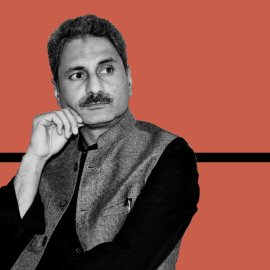Dastangoi and the World of Urdu Storytelling.

Octobre 2022 à juin 2023
Educated at one of India’s top school and Colleges, on meritorious scholarships, and then at the Universities of Oxford and Cambridge as a Rhodes Scholar, I brought my academic training to bear on reviving an Art form which sits at the interstices of performance and literature, and where my knowledge of history provided a good grounding to contest cultural amnesia and refashion a performance form. While I have dabbled in cinema and have written award winning books I am best known for my performances, and now for writing the texts of my performance. This is a form where scholarship, theatre, performance, and entertainment come together to form a new kind of narrative. A knowledgeable, even scholarly, performative narrative like the one I have re invented allows public dialogue on contentious issues, such as the Partition of India, India’s sedition laws, Muslim scholars of the Mahabharata, which has no parallels with anything else in the world. This is a world where Arts, entertainment, popular culture, scholarship, and revisionist work comes together as a whole reflecting and meeting my eclectic interests and accomplishments. I can make radical comments, or bring radical new scholarship, to mainstream audiences in a style where substance and form fuse into one single whole in the body of the performer.
Dastangoi and the World of Urdu Storytelling.
A project that traces the history and salient points of a storytelling tradition larger than anything ever published in the modern world. How this oral storytelling tradition prospered, why it didn’t gain salience in the ‘western’ imagination in the same was as The Thousand and One Nights and why it declined and disappeared from popular memory in India are the main themes of the project. The project recovers and reconstructs the world of outstanding storytellers who seamlessly fused literature and performance, and created fantasies more brilliant and stories more dramatic than anything known to mankind anywhere. It also describes how these supposedly ‘Islamic’ stories were actually quite profane, sometimes even sacrilegious. It finally analyses the impact of Imperialism on cultural and literary values, and the loss of ‘self.’ It is also a story of cultural revival and recovery.
BOOKS
Besieged: Voices from Delhi, 1857, Penguin/Viking, India, 2010. Awarded the Ram Nath Goenka Award For The Best Non-Fiction Book Of The Year, by the Indian Express Group
Habib Tanvir: Memoirs, a translation of theatre director Habib Tanvir’s memoirs from Urdu with notes and an introduction. [Penguin 2013.]
A Requiem for Pakistan: The World of Intizar Husain, A personal exploration of the literary and biographical world of Intizar Husain and a brief history of modern Urdu Literary Culture, [Yoda Press 2016]
Dastangoi (In Hindi and Urdu) Vol 1 and 2, an introduction to the Art of Dastangoi including stories compiled by the author, the recently resurrected art of Urdu storytelling, in Urdu (Arshiya publications) and Hindi (Rajkamal publications), 2011. With Mohammed Kazim
FILMS
Writer-Director Tihar-A World Within, on educational and artistic opportunities at Tihar, India’s largest prison @Tihar, 2016
Writer-director of the documentary “Dancing at Eighty-Habib Tanvir’s Naya Theatre”, 2006 on the life of one of India’s most innovative modern theatre directors
Co-screenplay writer of the film Harud
, the first film focusing on Kashmir which was produced in India, 2010Co-Director the Hindi feature Peepli Live, 2010